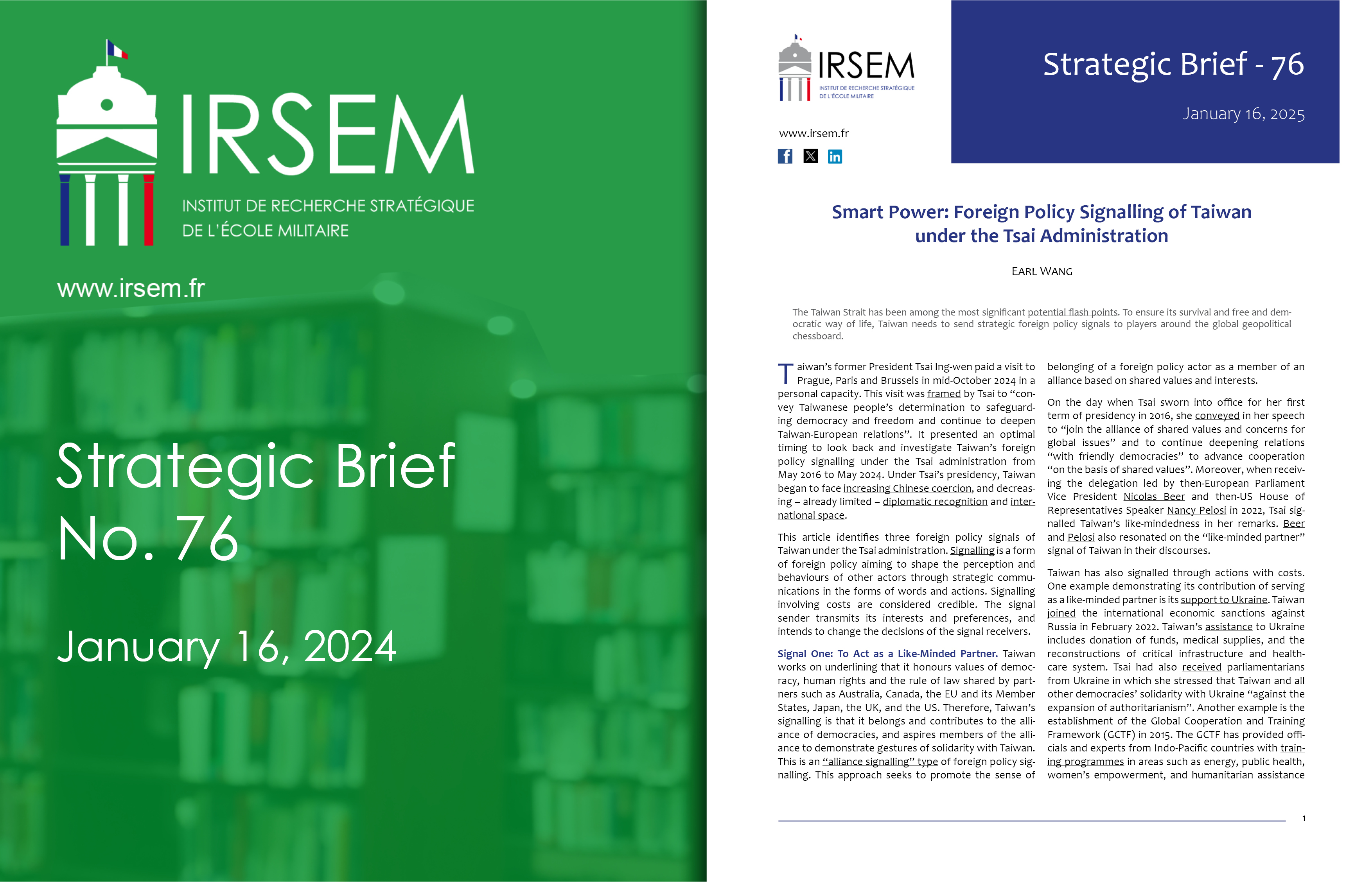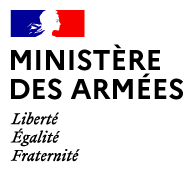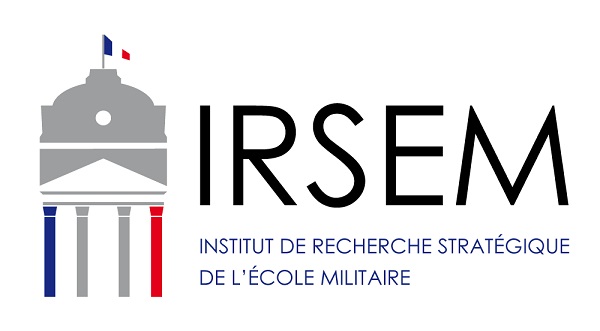
Download Strategic Brief No. 76
Smart Power: Foreign Policy Signalling of Taiwan under the Tsai Administration
Earl Wang
The Taiwan Strait has been among the most significant potential flash points. To ensure its survival and free and democratic way of life, Taiwan needs to send strategic foreign policy signals to players around the global geopolitical chessboard.
Taiwan’s former President Tsai Ing-wen paid a visit to Prague, Paris and Brussels in mid-October 2024 in a personal capacity. This visit was framed by Tsai to “convey Taiwanese people’s determination to safeguarding democracy and freedom and continue to deepen Taiwan-European relations”. It presented an optimal timing to look back and investigate Taiwan’s foreign policy signalling under the Tsai administration from May 2016 to May 2024. Under Tsai’s presidency, Taiwan began to face increasing Chinese coercion, and decreasing – already limited – diplomatic recognition and international space.
This article identifies three foreign policy signals of Taiwan under the Tsai administration. Signalling is a form of foreign policy aiming to shape the perception and behaviours of other actors through strategic communications in the forms of words and actions. Signalling involving costs are considered credible. The signal sender transmits its interests and preferences, and intends to change the decisions of the signal receivers.
Signal One: To Act as a Like-Minded Partner. Taiwan works on underlining that it honours values of democracy, human rights and the rule of law shared by partners such as Australia, Canada, the EU and its Member States, Japan, the UK, and the US. Therefore, Taiwan’s signalling is that it belongs and contributes to the alliance of democracies, and aspires members of the alliance to demonstrate gestures of solidarity with Taiwan. This is an “alliance signalling” type of foreign policy signalling. This approach seeks to promote the sense of belonging of a foreign policy actor as a member of an alliance based on shared values and interests.
On the day when Tsai sworn into office for her first term of presidency in 2016, she conveyed in her speech to “join the alliance of shared values and concerns for global issues” and to continue deepening relations “with friendly democracies” to advance cooperation “on the basis of shared values”. Moreover, when receiving the delegation led by then-European Parliament Vice President Nicolas Beer and then-US House of Representatives Speaker Nancy Pelosi in 2022, Tsai signalled Taiwan’s like-mindedness in her remarks. Beer and Pelosi also resonated on the “like-minded partner” signal of Taiwan in their discourses.
Taiwan has also signalled through actions with costs. One example demonstrating its contribution of serving as a like-minded partner is its support to Ukraine. Taiwan joined the international economic sanctions against Russia in February 2022. Taiwan’s assistance to Ukraine includes donation of funds, medical supplies, and the reconstructions of critical infrastructure and healthcare system. Tsai had also received parliamentarians from Ukraine in which she stressed that Taiwan and all other democracies’ solidarity with Ukraine “against the expansion of authoritarianism”. Another example is the establishment of the Global Cooperation and Training Framework (GCTF) in 2015. The GCTF has provided officials and experts from Indo-Pacific countries with training programmes in areas such as energy, public health, women’s empowerment, and humanitarian assistance and disaster relief. The US, Japan, Australia and Canada are full partners of the GCTF. Taiwan uses the GCTF platform to build and work with a network of like-minded partners.
Signal Two: To Establish Itself as a Strategic Actor in Global Value Chains. The second signal of Taiwan is to establish itself as a strategic actor in global value chains. Such a recognition is prominent in the technology industry, particularly the information and communications technology (ICT). This is a “status signalling” type of signalling. This approach establishes a belief or branding of status among other political actors. The target audiences of “status signalling” include both domestic and foreign audiences when a recognised status internationally helps boost legitimacy at home.
Tsai explicitly delivered Taiwan’s “status signalling” as a vital ally in global value chains to both domestic and foreign audiences in her discourses such as in the 2022 National Day Address. She stated the significance of Taiwan in optimising “more complete and resilient global supply chains” with the example of semiconductor. Tsai had also highlighted the high complementarity of industries of Taiwan, the US and European countries in constructing “more secure and resilient supply chains”. Foreign officials such as the Vice President of the European Parliament Committee on International Trade and the Chairperson of the US Senate Foreign Relations Subcommittee on East Asia and the Pacific had also echoed this signal in their remarks during visits to Taiwan.
For this signal, a significant action with costs that Taiwan has taken part in is the concept of “ally-shoring”. The most prominent example is the set-up of fabs of the Taiwan Semiconductor Manufacturing Company (TSMC) on the soil of Taiwan’s allies. TSMC’s recent announced plans to establish advanced manufacturing plants abroad include one in the Kumamoto Prefecture (Japan) in 2021, two in the State of Arizona (the US) respectively in 2020 and 2022, and one in Dresden (Germany) in 2023. US President Joe Biden was present at the installation ceremony of TSMC’s Arizona fab in 2022, and German Chancellor Olaf Scholz attended the groundbreaking ceremony in Dresden of TSMC’s first manufacturing plant in Europe. Biden and Scholz both depicted the importance of building up stronger supply chains or more resilient industries with allies and partners, resonating with Taiwan’s signal.
Signal Three: To Safeguard Peace and Stability while Enhancing Defence Capabilities. The third signal that Taiwan conveys is its resolve in safeguarding peace and stability across the Taiwan Strait, and at the same time, in building up its defence capabilities. This is a “threats and redlines” type of signalling. This approach involves drawing redlines and putting forward threatening measures to act upon violations. The addressees of this signal are not only potential menace sources or redline violators, but also domestic audiences and foreign ones that may be of support.
Tsai declared explicit redlines in her 2022 National Day Address: national sovereignty and the free and democratic way of life of Taiwan. In the same address, she signalled the resolve to safeguard peace and stability across the Taiwan Strait through dialogues with Beijing. At the same time, she also depicted Taiwan’s effort in increasing defence budget and strengthening defence capabilities to shoulder the responsibility of self-defence. Her address came around two weeks after Biden’s expression that US troops will defend Taiwan should there really be an “unprecedented attack”.
Taiwan has transmitted this signal through various costly actions. The first example is purchasing foreign military equipment and services, particularly from the US. Under the Tsai administration, Taiwan carried out 24 times of purchases of military equipment and services from the US of a total amount of $ 22.874 billion. The second instance is the advancement of domestic defence industries. The Tsai administration had set it as one of the top national defence priorities to build up the capacity of constructing indigenous aircrafts and vessels. Taiwan has inaugurated domestically-made military assets, notably the Brave Eagle advanced jet trainers, the Yu-Shan amphibious transport dock, the Teng Yun and the Chien Hsiang drones, the Haikun submarine. The third example is the conscription policy reform. Among other items of Taiwan’s military realignment plan announced at the end of 2022, the one-year mandatory military service for eligible male nationals will be reinstated starting from 2024 against the evolving geopolitical backdrop across the Taiwan Strait.
Taiwan held its most recent presidential election in January 2024, and Lai Ching-te inaugurated four months later. During the campaigns, Lai and the runner up, Hou Yu-ih, had both articulated their respective foreign policy signalling if elected. Though different in approaches, there is one commonality among the Tsai administration, Lai and Hou: the aim of Taiwan’s signalling is to ensure its survival and free and democratic way of life. The three foreign policy signals under the Tsai administration collectively demonstrated a combination of hard and soft power to achieve the aim.
Earl Wang is doctoral researcher and adjunct lecturer at the Centre for International Studies (CERI) – Sciences Po. He is also an associate with IRSEM’s Europe-Transatlantic-Russia Department.
Contact: earl.wang@sciencespo.fr

